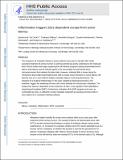| dc.contributor.author | Shibue, Tsukasa | |
| dc.contributor.author | Dongre, Anushka | |
| dc.contributor.author | Keckesova, Zuzana | |
| dc.contributor.author | Reinhardt, Ferenc | |
| dc.contributor.author | De Cock, Jasmine Morgan | |
| dc.contributor.author | Weinberg, Robert A | |
| dc.date.accessioned | 2018-07-13T13:13:25Z | |
| dc.date.available | 2018-07-13T13:13:25Z | |
| dc.date.issued | 2016-08 | |
| dc.date.submitted | 2016-06 | |
| dc.identifier.issn | 0008-5472 | |
| dc.identifier.issn | 1538-7445 | |
| dc.identifier.uri | http://hdl.handle.net/1721.1/116965 | |
| dc.description.abstract | The emergence of metastatic disease in cancer patients many years or decades after initial successful treatment of primary tumors is well documented but poorly understood at the molecular level. Recent studies have begun exploring the cell-intrinsic programs, causing disseminated tumor cells to enter latency and the cellular signals in the surrounding nonpermissive tissue microenvironment that maintain the latent state. However, relatively little is known about the mechanisms that enable disseminated tumor cells to escape cancer dormancy or tumor latency. We describe here an in vivo model of solitary metastatic latency in the lung parenchyma. The induction of a localized inflammation in the lungs, initiated by lipopolysaccharide treatment, triggers the awakening of these cells, which develop into macroscopic metastases. The escape from latency is dependent on the expression of Zeb1, a key regulator of the epithelial-to-mesenchymal transition (EMT). Furthermore, activation of the EMT program on its own, as orchestrated by Zeb1, is sufficient to incite metastatic out-growth by causing carcinoma cells to enter stably into a metastasis-initiating cell state. | en_US |
| dc.description.sponsorship | National Institutes of Health (U.S.) (Grant P01-CA080111) | en_US |
| dc.description.sponsorship | National Institutes of Health (U.S.) (Grant R01-CA078461) | en_US |
| dc.description.sponsorship | National Institutes of Health (U.S.) (Grant U54-CA163109) | en_US |
| dc.publisher | American Association for Cancer Research (AACR) | en_US |
| dc.relation.isversionof | http://dx.doi.org/10.1158/0008-5472.CAN-16-0608 | en_US |
| dc.rights | Creative Commons Attribution-Noncommercial-Share Alike | en_US |
| dc.rights.uri | http://creativecommons.org/licenses/by-nc-sa/4.0/ | en_US |
| dc.source | PMC | en_US |
| dc.title | Inflammation Triggers Zeb1-Dependent Escape from Tumor Latency | en_US |
| dc.type | Article | en_US |
| dc.identifier.citation | De Cock, Jasmine M. et al. “Inflammation Triggers Zeb1-Dependent Escape from Tumor Latency.” Cancer Research 76, 23 (August 2016): 6778–6784 © 2016 American Association for Cancer Research | en_US |
| dc.contributor.department | Massachusetts Institute of Technology. Department of Biology | en_US |
| dc.contributor.department | Ludwig Center for Molecular Oncology (Massachusetts Institute of Technology) | en_US |
| dc.contributor.mitauthor | De Cock, Jasmine Morgan | |
| dc.contributor.mitauthor | Weinberg, Robert A | |
| dc.relation.journal | Cancer Research | en_US |
| dc.eprint.version | Author's final manuscript | en_US |
| dc.type.uri | http://purl.org/eprint/type/JournalArticle | en_US |
| eprint.status | http://purl.org/eprint/status/PeerReviewed | en_US |
| dc.date.updated | 2018-07-12T16:21:23Z | |
| dspace.orderedauthors | De Cock, Jasmine M.; Shibue, Tsukasa; Dongre, Anushka; Keckesova, Zuzana; Reinhardt, Ferenc; Weinberg, Robert A. | en_US |
| dspace.embargo.terms | N | en_US |
| dc.identifier.orcid | https://orcid.org/0000-0002-3149-5128 | |
| dc.identifier.orcid | https://orcid.org/0000-0002-0895-3557 | |
| mit.license | OPEN_ACCESS_POLICY | en_US |
